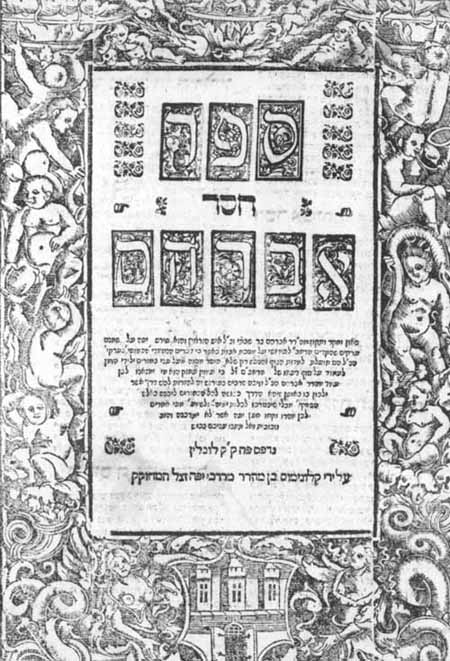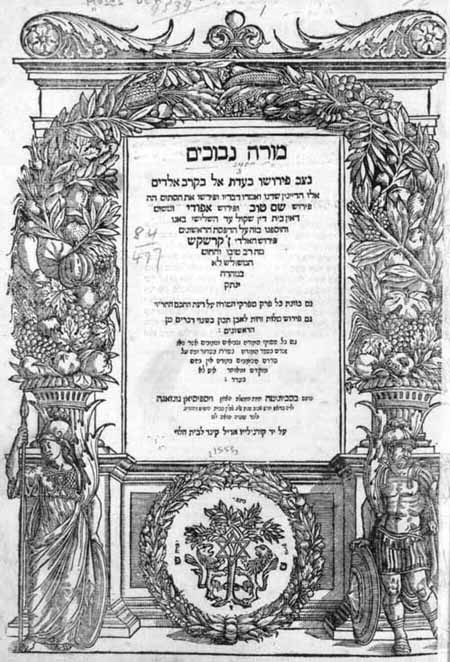The Work of Maimonides: Maimonidean Treasures
Maimonides was only sixteen years old when he completed his first work, a technical treatise on logic of which the Library has the first edition, Millot ha-Higgayon (Terms of Logic), Venice, 1550. Written in Arabic, it was translated into Hebrew by Moses ibn Tibbon, who gave it its Hebrew name. Its theme and structure presage Maimonides's later works. The division of this first work into fourteen chapters foreshadows the fourteen-section composition of the Mishneh Torah. The Library has a fine copy of the first edition, printed in Venice in the publishing house of Marco Antonio Giustiniani, under the supervision of Cornelius Adelkind. By the end of the nineteenth century no less than fourteen editions had appeared, all with commentaries, the most notable of which is that of Moses Mendelssohn.
Hesed Avraham (Compassion of Abraham), Lublin, 1577, is an early commentary on the Shemona Perakim (Eight Chapters), Maimonides's introduction to his commentary on the tractate Pirke Avot (Ethics of the Fathers) of the Mishnah, by Abraham Horowitz (1550-1615). The Eight Chapters may be viewed as an independent composition on therapeutic psychology for the soul. Maimonides argues that sentiments and attitudes of mind can be shaped and if necessary reshaped through spiritual exercises. The goal is the "golden mean" between extremes. Human tendencies, when they verge on either extreme, can be moderated, indeed must be moderated, if a person is to be virtuous.
Good deeds are such as are equibalanced, maintaining the mean between two equally bad extremes, the too much and the too little.
Liberality is the mean between miserliness and extravagance; courage between recklessness and cowardice; dignity between haughtiness and loutishness; humility between arrogance and self abasement ... Know, that moral excellences ... cannot be acquired or implanted in the soul except by means of the frequent repetition of acts resulting from these qualities, which, practiced during a long period of time, accustoms us to them. If these acts performed are good ones, then we shall have acquired a virtue.
 |
Horowitz, a leading Talmudic scholar in the Golden Age of Polish Jewry, was at an early age attracted to Maimonides and became both a keen student of his works and an avid admirer of his rationalistic method. He was drawn to the Eight Chapters because it celebrates human freedom and repudiates self-denigration and spiritual self-flagellation, both of which, in his day, were deemed indications of heightened piety. What was needed was the spiritual therapy which these Chapters offered, but being grounded in philosophy, in which few are trained, they are difficult to understand. For most individuals they remain "like a dream without interpretation." At the age of twenty-six, Horowitz wrote the needed interpretation. Later in life, he turned from rationalism to mysticism and issued a new version of his commentary to "supersede the earlier one." It became the widely accepted standard commentary, appearing with the text in most editions of the Talmud.
Because of the vicissitudes of history, early Lublin imprints have become rarities, especially this edition of the work whose "authorization" was withdrawn by the author himself. The publishers, Kalonymus Jaffe and his sons, had only recently improved typography and ornamentation, so the volume is both rare and beautiful. The Library copy has the additional virtue of annotations inscribed by an early hand.
The Library also has a fine copy of the Venice, 1551 edition, the second Hebrew edition of the Guide, the first having been printed in Rome between 1473 and 1475. We have chosen the rarer, more beautiful, richer in commentaries and typographically more interesting 1553 Sabbioneta edition. The translation is by Samuel Ibn Tibbon. The publisher is Tobias Foa, first in a line of Foas whose presses produced Hebrew books in Sabbioneta as early as 1551, and as late as 1803 in Pisa. In the years 1551-59, Tobias Foa published twenty-six Hebrew books in Sabbioneta, years in which Hebrew books were being burned and Hebrew printing suppressed in other Italian cities. Overseeing this printing was Cornelius Adelkind, who for many years did the same for the Christian printers of Venice.
 |
The text of the title page is framed by architectural gates on which stand vases overflowing with fruits and vegetables, guarded by a helmeted man and a woman holding a spear. They flank a wreath enclosing the crest of the Foa family: a blossoming tree flanked by lions, a Star of David, the legend "The righteous shall flourish like a palm tree" (Psalm 92:13), and the initials T. F. The title page proudly announces that, in addition to the commentaries Shem Tov (by Joseph Ibn Shem-Tov) and Efodi (by Profiat Duran), both of which had appeared in the Venice edition, a third, that of (Asher) Ibn Crescas has been added, and "the three-fold cord is not easily sundered." (Ecclesiastes 4:12)
Sources:Abraham J. Karp, From the Ends of the Earth: Judaic Treasures of the Library of Congress, (DC: Library of Congress, 1991).


